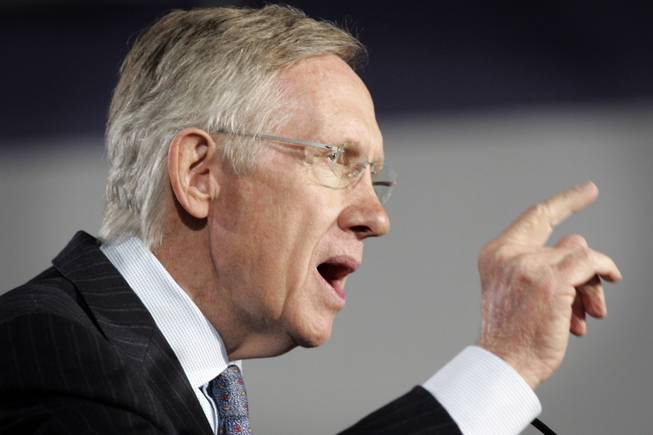
Leila Navidi
Senator Harry Reid speaks during a rally with First Lady Michelle Obama at Canyon Springs High School in North Las Vegas in 2010.
Sunday, Dec. 25, 2016 | 2 a.m.
As Senator Harry Reid retires from Washington, eight stories were put together to highlight a career that spans decades.
Hometown is bracing to lose its greatest champion
When this tiny desert town’s most famous former resident visited in recent years, he sat in the same corner booth at Terrible’s Road House while his entourage of black sport-utility vehicles lined the parking lot.
“It was impressive for Searchlight,” said Pat Milliren, a cashier at the casino off U.S. Highway 95, about an hour south of Las Vegas.
Sen. Harry Reid grew up here and put Searchlight on the national radar. The 77-year-old politician has frequently referenced his hometown throughout his more than three decades representing the Silver State in the nation’s capital.
Searchlight, in return, has embraced its homegrown power player: His portrait greets visitors inside the town’s community center. His biography hangs in the museum down the hall. And the elementary school bears his name. On a new welcome sign, organizers wanted to add a line saying “Home of Harry Reid,” but local historian Jane Bunker Overy said that’s where the senator drew the line.
Related content
With Reid retiring from the Senate in January, Searchlight residents are bracing for a future without their biggest advocate in power. The former mining town — once larger than Las Vegas — now is home to roughly 800 full-time residents, many of whom are retirees seeking a quiet life.
Sitting inside her office on a recent afternoon, Overy clutched two notecards covered in her cursive handwriting. She didn’t want to forget any of Reid’s contributions to the town, so she jotted them all down.
The senator played a role in upgrades big and small, she said, like nearby hiking trails, roadway signs honoring veterans, a senior housing project and the expansion of U.S. 95, which made the dangerous two-lane road with no shoulders a four-lane highway leading into town. “It’s been a godsend really,” Bunker said of the highway project.
And much of it began with a phone call.
“People say, ‘You mean, you just pick up the phone and call Sen. Reid?’ I say, ‘Well, he picks up the phone and calls me,’” she said.
In 1980, Overy moved to Searchlight from the Houston area, where petrochemicals were endangering her life. Go to the high desert, her doctor said. So she and her husband set their sights on the clean-air mecca of Searchlight.
Back then the town also largely supported its budding political star and his party.
“It was so lopsided in Harry’s favor,” said Overy, who registered as a Democrat shortly after moving here. Drive through town now and you’ll see more than one bumper sticker supporting President-elect Donald Trump.
It’s not necessarily that people dislike Reid, Overy said. They simply don’t know him very well. Many residents who grew up with him have passed away or moved, and new residents lack that personal connection. She wishes more people realized his enormous impact on Searchlight — and the hole his retirement leaves.
“When you put someone new in, it takes a long time for that person to learn the ropes,” Overy said, “let alone work the whole system.”
Will and Sue Berg adopted Searchlight as their retirement home a decade ago, and they consider Reid and the late Verlie Doing, a longtime community leader and previous owner of the casino, the crucial forces behind all that’s good about the town today, from the library and senior center to the preservation of area wildlife.
“I think they are landmark people who helped keep our feet down and keep us going,” said Sue Berg, who met Reid once when he strolled through town campaigning for now-President Barack Obama. “He was very open to people. He’s very genuine.”
In a sense, Searchlight lost its champion more than two years ago, when Reid sold his home there to a gold-mining company. He and his wife, Landra, now own a home in the Anthem area of Henderson, though it doesn’t seem like the senator has lost any affection for his hometown.
“It’s a long way from Searchlight to the United States Senate,” Reid said during his farewell address on the Senate floor.
Come Jan. 3, when the 115th Congress convenes, Searchlight won’t have one of its own just a phone call away in Washington, D.C.
“I’m sure we won’t get mentioned like we did on occasion,” Milliren said. “That was kind of nice.”
Fabled politician reflects on Nevada's senior senator
When Oscar Goodman traveled to Washington, D.C., while serving as mayor of Las Vegas, Sen. Harry Reid’s office was his first stop. The two iconic Nevadans, who passed the bar exam within a year of each other, would chat about old Las Vegas, catch up on each other’s families and discuss the city’s needs. Had you been in the room, you might have assumed they’d been friends for decades.
You’d have been wrong.
They clashed on two occasions in the 1970s, when Goodman was representing clients with ties to organized crime and Reid was a state gaming regulator. The worst came in December 1978, when Reid staged a weekend hearing to determine whether to grant mob-connected casino executive Frank “Lefty” Rosenthal a license.
Goodman, who represented Rosenthal, was coming off of a professional setback — a grueling case in Salt Lake City had ended in a mistrial — and had traveled to New York City to see relatives when he got an emergency call that the meeting had been scheduled.
He asked Reid to postpone it for a week to allow him to rest and prepare.
“He said, ‘Absolutely not,’” Goodman said. “My wife was a little peeved about it, so she called and asked him to continue it. And he said, ‘Absolutely not.’”
After a hearing that Goodman described as a “dog and pony show,” Rosenthal was denied the license. He lashed out at Reid, creating a scene that would later be re-created in the movie “Casino.”
“I was angry for years about that, because I felt Rosenthal didn’t get a fair hearing,” Goodman said. “Ordinarily, I would jump in and strangle my client to keep them from saying the kind of things he was saying. But in that instance, I was really delighted that Rosenthal was reaming Harry out. After that, Harry and I didn’t speak for years. As far as I was concerned, there was animosity. Whatever friendship we had came to termination.”
But that changed in 1999 when Goodman was elected as Las Vegas mayor for the first of what would become three terms.
“Not that he said let bygones be bygones, but he said, ‘Come to Washington for any reason,’” Goodman said. “He was kind enough and a gentleman to introduce me to all the senators back there. He bent over backward to make me feel at home.”
Goodman said Reid had since been an unwavering supporter of projects for which he and his wife, current Las Vegas Mayor Carolyn Goodman, sought help from the federal government. That included funding in the 2009 stimulus package for the Mob Museum, which Reid got behind despite pressure from lawmakers who found it frivolous.
“As far as the city’s concerned, everything we asked him for and asked his office for, he was amenable to,” Goodman said.
Meanwhile, Goodman said Reid was a champion for the city in his fight against development of the proposed Yucca Mountain nuclear waste repository.
“He really used whatever power he had to ensure high-level nuke waste wasn’t going to be transported through our community and stored 90 miles away,” Goodman said.
Asked if he’d ever brought up the Rosenthal hearing to Reid, Goodman said, “There’s nothing to address. It happened. I still resent it, but things happened in the interim where he has been nice and gracious. So I guess you have to balance everything.”
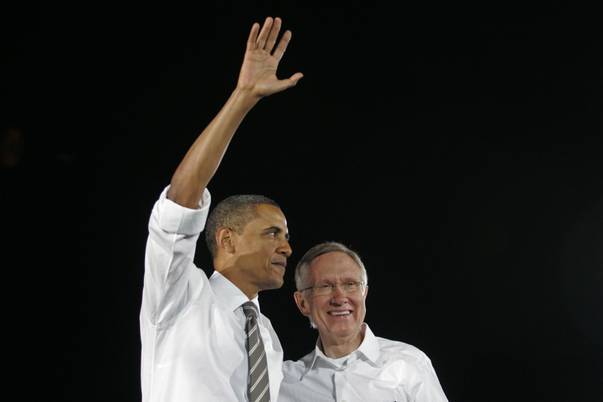
President Barack Obama and Sen. Harry Reid wave to the crowd after a speech outside Orr Middle School at a "Moving America Forward" rally in 2010. Upon Reid's retirement, Obama said: "It is no exaggeration to say that America wouldn’t have accomplished all we have these past eight years — or the past three decades — without Harry Reid. He is as tough and shrewd as they come, unafraid to do the right thing, and has never stopped fighting for folks who can’t fight for themselves.”
2006 meeting helped prod presidential run
Since becoming a first-term senator in January 1987 through his rise to being one of the longest-serving Senate Democratic leaders in history, Harry Reid has encountered dozens of freshman lawmakers on the chamber floor. One particular senator fascinated him.
Majority Leader Reid summoned the Democrat who had served just a year and a half to his office one summer day, and the rookie remarked to an aide, “I wonder what we screwed up.”
Reid had sensed the young senator was frustrated and destined for something bigger. After 20 minutes, the newcomer walked out of Reid’s office and told the aide (future White House Press Secretary Robert Gibbs), “Harry wants me to run for president.”
Not that Illinois Sen. Barack Obama needed the blessing, as reported by John Heilemann and Mark Halperin in their 2010 book “Game Change,” but Reid undoubtedly provided a nudge.
“Years later, Reid would claim that he was steadfastly neutral in the 2008 race; that he never chose sides between Barack and Hillary (Clinton); that all he did was tell Obama that ‘he could be president,’ that ‘the stars could align for him.’ But at the time (July 2006), in truth, his encouragement of Obama was unequivocal,” the duo reported.
Then finishing her first term as the junior senator from New York, Clinton had developed a public reputation for deference and bipartisanship, but in private she “was something of a scold toward her party’s leadership, forever prodding Reid to develop a sharper and more consistent approach to battling the Republicans,” Heilemann and Halperin wrote.
Reid reportedly didn’t want to cross Clinton, but he and other senators clearly wanted robust competition for what was shaping up to be a Clinton coronation for the Democratic nomination.
It was a role he played eight years later as Vermont Sen. Bernie Sanders mounted a surprisingly resilient challenge to Clinton in the 2016 presidential primary season.
By the eve of the Nevada caucus on Feb. 20, 39 of the 44 Democrats serving in the U.S. Senate had endorsed Clinton, noted Eleanor Clift for The Daily Beast. Reid was not among them, counting on a lively caucus to boost Democratic voter registration to help his choice to succeed him, Catherine Cortez Masto, in the general election.
“I’m more concentrated on what effect my endorsement has in Nevada, OK? Eight years ago, we registered 30- to 40,000 new Democrats. Tens of thousands; it was unheard of,” Reid told Politico in February. “For me to endorse somebody would just take away the focus on the caucus.”
While Reid was politically circumspect with some, he left no doubt of his feelings for two other presidential aspirants from the Senate — Al Gore, who arrived in 1985, and Republican John McCain, who arrived the same year as Reid.
In a speech at Lake Tahoe introducing Gore in 2013, Reid said. “Al Gore and I have known each other since 1982 (when both were freshmen congressmen). If there were ever two nonblood brothers in the world, it’s him and I. I just think so much of him because he’s been so good to me, and I’ve tried to reciprocate.”
While Reid and the Arizona senator have had their ups and downs, Reid told the Las Vegas Review-Journal in August 2008 that he “can’t stand John McCain” and that McCain “does not have the right temperament” to be president.
One low point occurred the same year Reid lauded Gore. The New York Times Magazine reported McCain was so angry that Reid threatened to invoke the so-called nuclear option — which would require only a 51-vote majority to confirm most presidential and judicial nominations — that he told Reid, “Harry, I’m going to go kick the crap out of you.”
Reid said, “John, I would expect nothing less.”
Former governor looks back on Reid, 'Gold Dust Twins' era
Richard Bryan recalls meeting then 24-year-old Harry Reid at the three-day Nevada Bar exam in 1963. Bryan, who graduated from Las Vegas High School in 1955, and Reid, who graduated from Basic High School two years later, made a connection that grew into a lifelong political partnership and personal friendship.
“What was impressive is that he hadn’t yet graduated from law school when he took the bar exam,” Bryan recalled, laughing.
Both became active in Clark County’s Young Democrats shortly after passing their exams and were elected as hospital trustees in 1966. As their camaraderie built, the two had no idea they’d spend the better part of 35 years working as political colleagues on state and federal levels. They were elected to the Nevada Assembly in 1968 and nicknamed the “Gold Dust Twins.” While Reid became lieutenant governor of Nevada in 1971, Bryan was elected to the state Senate in 1972.
Bryan, who served as governor from 1983 to 1989 and in the U.S. Senate alongside Reid from 1989 to 2001, couldn’t recall a time when they disagreed on “Nevada issues.” He said Reid was a tireless advocate for the state, citing its growth in the drone testing industry and funding for projects on the Truckee River as recent examples of “thousands” of gains over the years thanks to Reid.
“One may not always agree with him, but one could not challenge his dedication to the people of the state of Nevada,” Bryan said. “He has been tenacious and incredibly effective as both the majority leader and as the minority leader. ... No one had greater influence on the legislative process in the Congress. Period.”
On a personal level, Bryan said Reid was a man of “great dry wit who can be incredibly funny. … He’s not what you would call an extroverted political figure, but that’s not to suggest he doesn’t have a great sense of humor.”
He added that Reid’s personality was especially apparent around his wife of 57 years, Landra.
“He is tough as nails, a bitter advocate and fierce opponent in the political scene,” Bryan said, “but when it comes to her it’s a different Harry Reid that you see. Pure devotion and love.”
State's senior voice in Congress lauds Nevada's protector
“I can’t go there; there’s just nothing to say,” U.S. Rep. Dina Titus said when asked if there were anything she wished Harry Reid had done better during his decades in Washington.
Titus, who served in the Nevada Senate before representing the 3rd and then the 1st Congressional District, worked with Reid for six years at the federal level and described him as someone who “speaks softly and carries a big stick.” Among policies she most respected from her Democratic colleague was his push to protect Nevada’s environment, from public land grants and a land monument at Tule Springs to blocking federal funding to turn Yucca Mountain into a nuclear waste dump.
“That whole environmental piece of his agenda has kind of changed the face of Nevada,” Titus said. “I think there’s a very close connection to his soul there.”
Reid’s influence was especially felt in the general election, Titus said, as Nevada stayed blue pretty much across the board.
The Silver State’s Democratic success came largely thanks to Reid’s “machine” of politicians, labor unions and registered voters whose numbers swelled after he successfully made Nevada a caucus state in 2008.
“He is very soft-spoken, but sometimes that’s a good ploy because you have to lean in to listen to what he has to say, and it gives him an advantage in any kind of negotiation. He’s definitely good in the trenches behind the scenes,” Titus said.
She said she wished Reid had sought another term. “If you had an epitaph for him, it’d be that everything he has done points to the protection of Nevada.”
'We were always trying to help Nevada,' former reid deputy chief of staff recalls
Darrel Thompson worked for Barack Obama’s 2004 U.S. Senate campaign, and as an adviser to former House Majority Leader Dick Gephardt. But Thompson said that being Harry Reid’s deputy chief of staff from 2005 to 2013 was “the best political job of my life.”
Now working as a consultant and lobbyist for Washington, D.C.-based firm TheGroup, Thompson said Reid’s passion for Nevada caused him to “fall in love with the desert,” and that Reid’s dogged dedication to the job inspired the young staffer to run for office in his own D.C. district.
Thompson didn’t win election, but he’s driven to this day by Reid’s example of meaningful service.
“We were always trying to help Nevada with everything we did,” Thompson recalled. “That was the model.”
He said workdays lasting 12 hours or more were standard for Reid, and that the senator famously didn’t brake for his own health, whether slipping on the ice while jogging in 2009 or coming through a bad vehicle crash in 2012.
“He was jogging one morning and somehow managed to slip and hurt his shoulder,” Thompson said of the 2009 incident. “He had a good shiner on his eye, too, and it looked like he got beat up by about 10 people. Well, we had a meeting at 9 that morning with international labor union folks coming in, and he still made it.”
Asked to encapsulate the venerable senator’s impact on the Democratic Party in Nevada, Thompson pointed to the state becoming “solidly blue.” While he remembers Reid’s goal of registering between 50,000 and 100,000 new Democrats prior to Nevada’s 2008 caucus being doubted and even laughed at, the tally reached 120,000.
Reid’s ability to win close elections was “remarkable,” Thompson said with a chuckle, adding that his staffers all “very much looked up to and learned from him.”
When press secretary pulled up lame, his boss was fascinated, concerned
Editor’s note: Sun assistant general editor Adam Candee is Harry Reid’s former press secretary.
Harry Reid rolls down the window in his customary second-row seat of a giant SUV and wants to know all about this sudden hamstring injury of mine, the one forcing me to swing a driftwood leg behind.
How did I do it? (Softball. Beer-league softball. Beer-league softball practice, to be exact and embarrassing.)
Did I go to the doctor? (Pay money so someone can tell me I’m an idiot for sprinting around like I’m Mike Trout on a lazy Sunday at Sunset Park? No thanks; the voices in my head have that covered.)
How severe is it? (This limp is the real deal. I promise I’m not doing this to get sympathy from girls. My wife would disapprove.)
Is it as bad as Gene’s old injury? (His Capitol Police guy, a former college track star, completely tore his hamstring ... so, uh, no.)
The wind blusters as it so often does on April afternoons in Southern Nevada, my hair flying askew as I ponder how we will navigate the assembled media. With our boss in the press operation on vacation, my colleague Tom Brede and I are responsible for reporters on this sun-soaked Thursday.
They, of course, want to talk about the story of the day — an education-related issue that might put you to sleep here — and not Reid’s induction into the Boys and Girls Club of America Hall of Fame that we are celebrating.
Last-second review of our talking points does not rank atop Reid’s priorities right now. And considering my relatively junior status on the staff, I’m not about to push the most powerful man in the United States Senate to go over something he already forgot more about than I’ll be able to blab at him in the next five minutes.
Honestly, though, at this point, we’re just two guys talking sports and that’s pretty cool. He’s Harry Reid, Nevada’s Godfather, a son of tiny Searchlight who survived someone trying to bomb his car to become Nevada’s political protector. I’m … some guy with a pulled hamstring who inexplicably fascinates Harry Reid.
It’s time to go in now, and I tell the senator I’ll meet him inside. After a few painfully slow leg-drags toward the building, Reid calls to me from the car.
“Hey, Adam! Nice limp you’ve got there!”
A devilish grin fills the window. Zinged by Harry.
Inside the mostly routine event, the senator receives his honor and meets with the media scrum, veering from his prepared remarks — imagine that — just enough to prompt a call from me to Tom with a friendly warning about potential follow-up calls. ‘On your toes’ is a permanent state in our press shop, but Friday comes and goes quietly.
Early Saturday morning, one of Reid’s assistants wakes me with a call to say the senator wants to talk about the education situation. After a couple of deep breaths, I dial and Reid answers, immediately asking my opinion about Thursday’s media availability.
My answer does not matter. The small-talk question only briefly masks the serious business on his agenda.
“How’s your hamstring?”
Senators line up to honor their colleague
Earlier this month, Harry Reid sat with his hands interlocked and pressed to his lips as longtime Republican rival Sen. Mitch McConnell described the departing senator’s passion for baseball growing up in Searchlight.
“I wanted to throw fastballs for the Dodgers, Harry wanted to play centerfield at Fenway,” McConnell said. “We wound up as managers of two unruly franchises instead.”
With the attention of 33 senators and more than 120 additional friends, family, journalists and members of the public in attendance, Reid reflected on his career for 80 minutes in a solemn yet humor-spiked speech on the floor, leaving his fellow senators and the gallery laughing aloud on several occasions.
Senators in attendance included 2016 presidential candidates Marco Rubio of Florida and Bernie Sanders of Vermont.
After the speech, the 28 Democratic senators in attendance and three of the five Republicans lined up at Reid’s desk for hugs and handshakes.
Then Reid and all but two senators walked out of the room as his Republican counterpart in Nevada, Sen. Dean Heller, prepared to speak on Reid’s legacy.
Heller delivered a heartfelt speech.
“Harry, you share the Nevada values like faith in God, hard work, commitment to family,” Heller said. “I know because you displayed these values at home, at work and at church.”
Minority Whip Dick Durbin, highlighted Reid’s voting record on Yucca Mountain, the “most important” bills in his political career.
“It’s appropriate he’s not on the floor,” Durbin joked, “because it’s painful for him to sit around and hear anybody say anything nice about him.”
This send-off collection to Harry Reid was written by Jackie Valley, Ric Anderson, Paul Szydelko and Chris Kudialis.
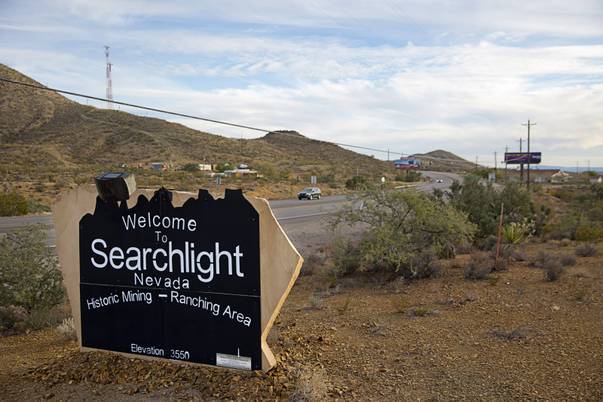
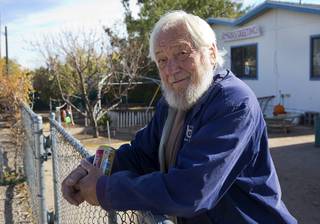
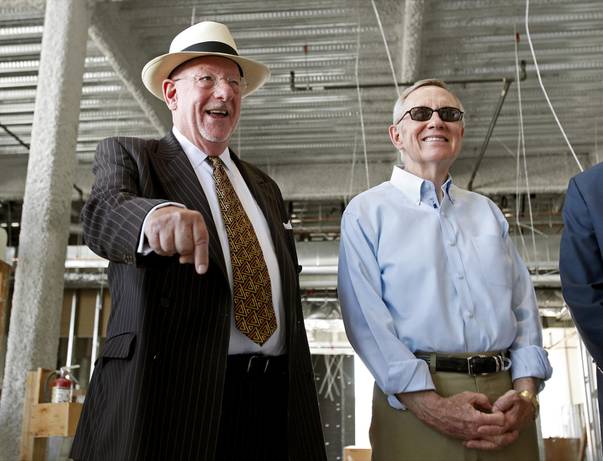
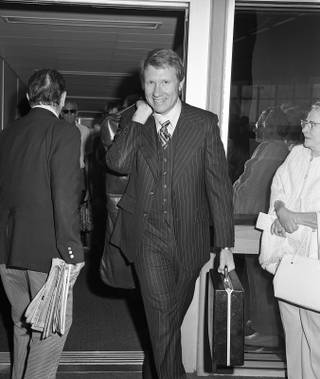
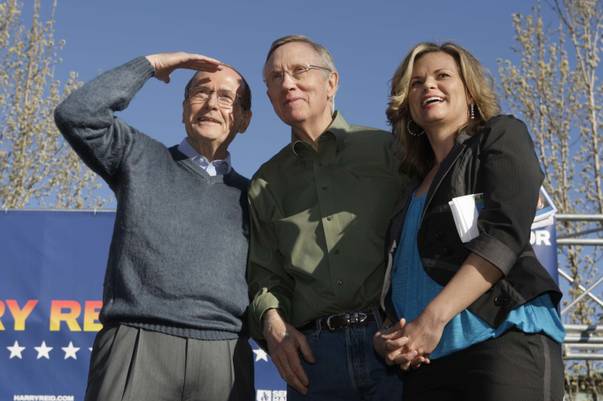
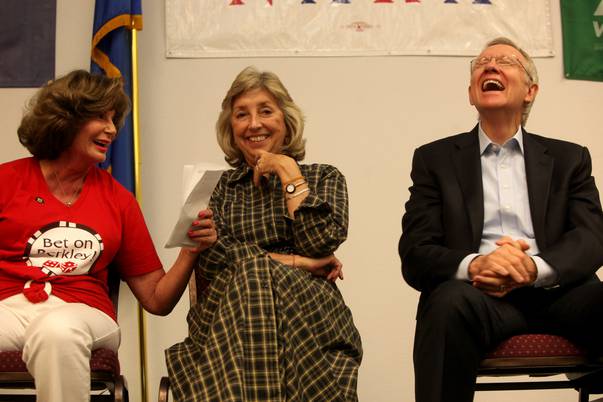
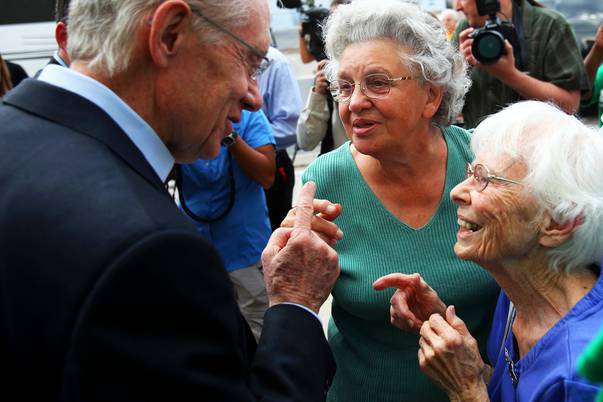
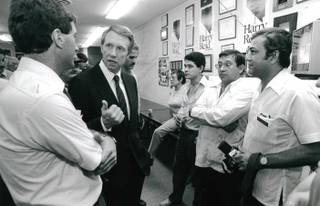
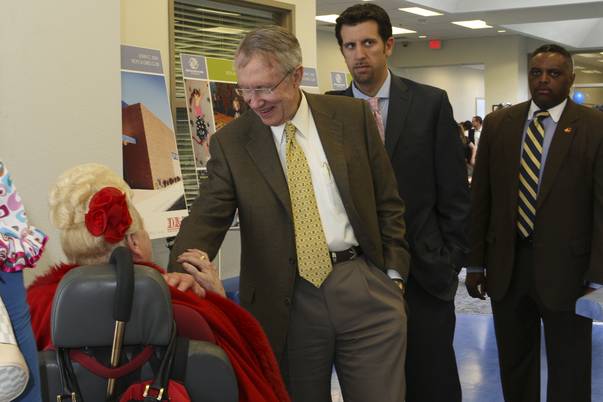
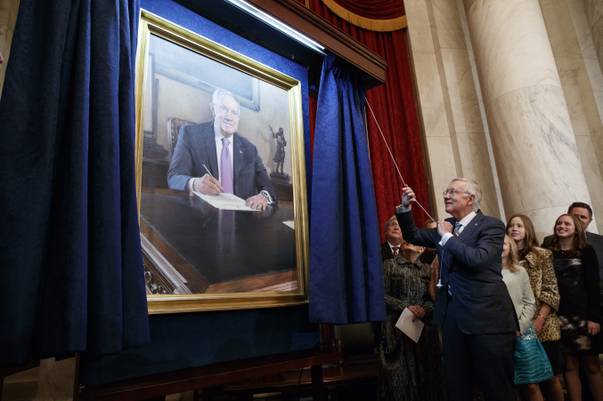

Join the Discussion:
Check this out for a full explanation of our conversion to the LiveFyre commenting system and instructions on how to sign up for an account.
Full comments policy